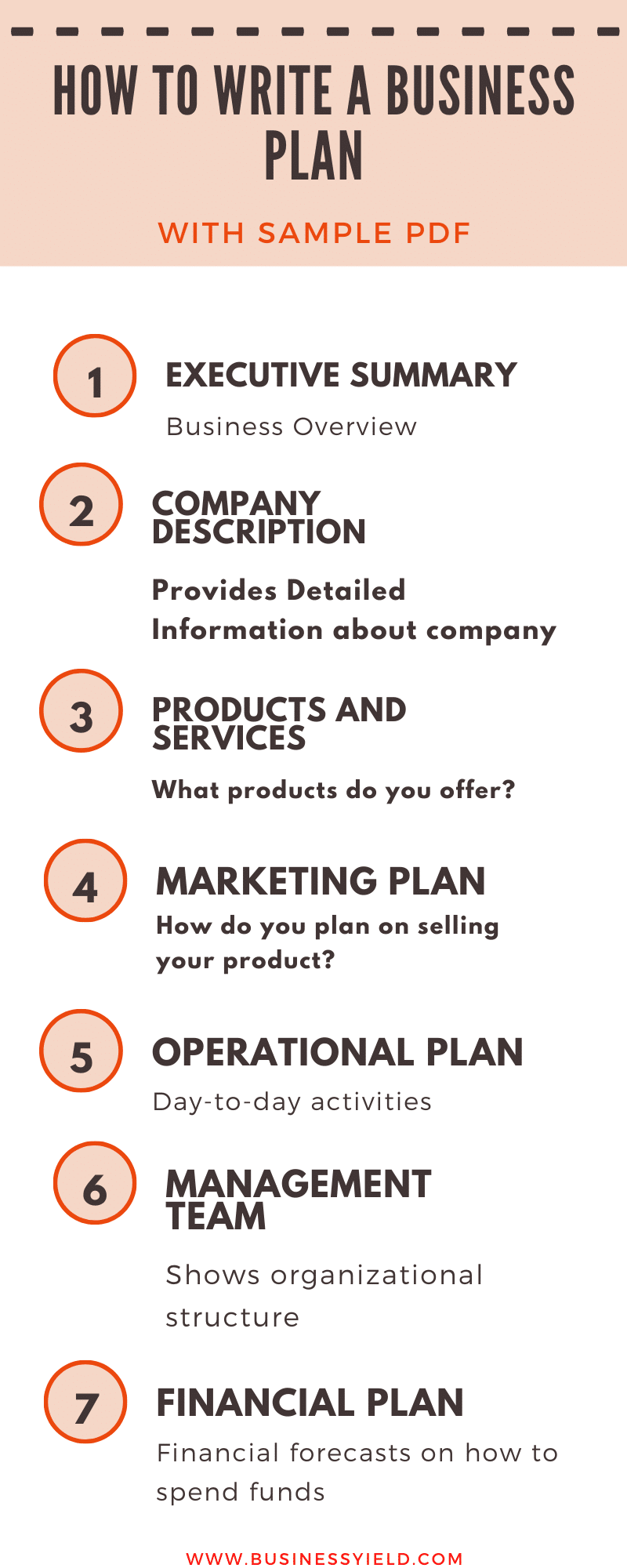A business plan can be likened to the heart and life-wire of a business. Without it, a business cannot survive some inevitable setbacks. Anyone who is serious about their startup or expansion needs to have a well-crafted business plan that depicts their modulus operandi. Without much ado, we will show you how to write a business plan, the essential information and components to be contained in it, and provide a sample business plan written by Businessyield Consults.
You can download the sample later on as a guide to help you write a good plan for your business.
Before we start on how to write a business plan, we need to find out what a business is.
What is a Business Plan?
A client with whom I was working argued that a company does not need a plan. He sighted instances of companies he knew that did not have a business plan. After proper evaluation, we found out that he did not really know what a business plan was.
Now let us break it down.
A business plan is a document with every crucial detail of the business operation and growth plan. As a result, it covers what you are going to sell or produce; the structure of your business, your vision, how to sell the product, how much funding you need, information on financial projections; and basically everything your business needs to thrive. Doesn’t this sound like just a written-down plan? That is a business plan, simply put!
It actually guides you through each stage of starting, managing, and expanding your business.
The mistake most people make whenever a business plan is mentioned is that they think a professional business analyst needs to write it. That is actually true, but not entirely.
Insofar as giving it that professional touch makes it more comprehensive, it doesn’t dissociate the fact that you can craft out a guide that you can follow to run your business.
The Benefits of a Business Plan
There are numerous benefits you, as an entrepreneur, can gain from having a business plan. First, think of it as a GPS. It helps steer your business in the right direction. Also, business plans can help you get funding or bring on new business partners. Investors want to feel confident they will see a return on their investment. Your business plan is the tool you will use to convince people that working with you or investing in your company is a smart choice.
In addition, having a business plan does not guarantee success in business. Absolutely not! But great planning is often the difference between success and failure.
What a great business plan does is help you succeed. It sets the stage for your entrepreneurial success.
See Also: how to choose a business name. You require a business name before writing a business plan.
Download 500+ business plans instantly
Who is responsible for writing a business plan?
Any individual or a group of individuals who start a business is responsible for writing a plan though one can choose to hire a business consultant
It’s important to remember that this is not a document for internal use only. On the contrary, it is a promotional document that will undergo constant updates and changes. As your business grows and market condition changes, the business plan also undergoes changes.
Keep in mind who you are writing to (investors, customers). In other words, write your business plan in an easy-to-read language without difficult words and terms.
Basic Components of a Business plan
Did you know that a business plan can just be written to source funds?
So, whether you’re writing a business plan to raise money and grow your business or just need to figure out if your idea will work, every business plan needs to cover 7 essential areas, and each of these components is important and should not be left out.
Here’s a quick overview of each topic. We have an in-depth analysis of each in the sample business plan you will get later on in the post.
#1. Executive Summary:
The executive summary is an overview of your business, vision, and plans. It comes first in your plan, and is ideally only one to two pages. Most people write it last, though this is because it is the summary of other components of a business plan.
An executive summary is meant to cover the following;
- What sector are you in?
- Products/services you provide
- Your target audience
- What does the future of your industry look like?
- Your plans for business
- Who are the owners of your company? Backgrounds? Experience in sector/business?
- What motivated you to start your company?
#2. Company Description:
As part of the components of a business plan, company description is equally important. It provides detailed information about your company, company structure, team members, or who works in your company, and what they do. Problems your business solves. Your company description is the place to boast about your strengths and competitive advantages.
#3. Products and/or services
It includes information on the products or services you offer. This is also where you sell the benefits of your business. You elaborate on how your business is different and better than your competitors.
This section shows these;
- How much does it cost to produce? How much will you sell each piece for?
- Is there packaging?
- How will the client purchase the product?
- What system will you use to bill them?
- Are there extra costs in getting it to the customer? How will it be transported?
#4. Marketing plan/analysis
Number four on the list of business plan components is the marketing plan/analysis. This section shows how you plan to reach your target market, how you plan on selling to those target markets, what your price plan is, and what types of activities and partnerships you need to enter into.
In getting your market analysis and plans right, figure out how to go about advertising, and also distribution medium.
Find out how to create a winning marketing plan for African businesses.
#5. Operational plan
When talking about operational plans, we mean the day-to-day activities of the company. It explains the;
- Location/Logistics of your business
- Transportation if you are into sales
- Legal — Do you need a License? Do you need to join a union or other professional organization?
- Inventory — if you’re selling a product, where will you need to store it?
- Providers/Suppliers/Freelancers — Detailed contact info/pricing for anyone you’re outsourcing to.
The idea is to paint a visual picture of how your company will work. Consequently, you can even include a photo or video showing it.
#6. Organization and Management Team
What forms this section is a hierarchical chart of leadership. It involves a list of positions and functions of each integral member of your business.
You also need to describe any steps for your staff to expand. Here is a tip, reflect it in your financial plan and discuss any new hires you want to make and why. Your business plan isn’t just about where your company is, but where its future is headed.
This section helps you evaluate the skills, experiences, and resources your management team will need. Addressing your company’s needs during implementation will make a major impact on your chances of success.
#7. Financial Plan
This is a very vital one among the components of a business plan. To write a good business plan, you must be critical in this area. You must understand that your business plan isn’t complete without a financial forecast. We will not tell you what to include in your financial plan, but you’ll definitely want to start with a sales forecast, cash flow statement, income statement (also called profit and loss), and your balance sheet without forgetting your start-up cost.
Provide a financial outlook for the next five years. Include capital expenditure budgets. For the first year, be very specific and use quarterly — or even monthly — projections. Make sure to clearly explain your projections, and match them to your funding requests.
This is a great place to use graphs and charts to tell the financial story of your business.
A Business Plan Sample
A typical business plan sample usually consists of at least 15 pages. However, we will give just a synopsis of a business plan written by BusinessYield Consults. The full document can be downloaded later on in the post.
Get any business plan in few moments here (500+ plans)
MARKET ANALYSIS SECTION (Excerpt from our business plan sample)
#1.Market Trends
The market for luxury services such as Taxi services is driven by the growth in the economy and the increase in consumers’ spending – in essence, as the general economy of a country grows, more people will have enough financial resources to patronize luxury services such as making use of taxi cab or hiring a limousine as against making use of public buses and trains et al.
Besides, revenue generated by the Taxi services company is driven by business and leisure travel. No doubt, the profitability of operators in this industry depends on good marketing and networking. As a matter of fact, small taxi cab companies can effectively compete with large ones because there are few economies of scale in this line of business. Research shows that the taxi cab services industry is fragmented: the top 50 companies account for less than 35 per cent of the total revenue generated in the industry.
Lastly, technology has indeed played a major role in this industry; especially in cutting down cost and enforcing safety and monitoring measures. GPS car tracking device readily comes to mind. There is hardly any taxi cab services company that does not have a GPS car tracker installed on all their cabs. It helps them in monitoring their fleets and also in planning and budgeting et al.
#2. Our Target Market
Before choosing a location to launch our taxi cab services company, we conducted our feasibility studies and market survey and we were able to identify those who will benefit greatly from our service offerings. Basically, those who will benefit from our service offering are households, corporate organizations, travel and tour agencies, hotels and
government agencies.
Below is a list of the people and organizations that our taxi cab services are designed for;
- Celebs and public figures
- Event planners (car rental services for weddings and social functions)
- Travel and Tour Agencies
- Hotels
- The public sector; government ministries, agencies, and parastatals.
- private sector
- Households
- Corporate Executives
- People in business
- Government
- Household
#3. Our Competitive Advantage
The taxicab services business is easy to set up, especially if you have the finances and the ability to run and manage a business. It means that the possibility of a taxicab services business springing up in the location where our company is located is high. We are aware of this, which is why we decided to come up with a business concept that would position us to become the leader in Owerri.
Our competitive edge is that we are a standard and well-equipped taxi cab service company that is positioned to handle both corporate clients and individual clients.
We can confidently say that the strategic locations we intend to cover, the business model we will be operating on, ease of payment, a wide range of highly reliable and comfortable cars, highly trained and courteous drivers, and, of course, our excellent customer service culture, will definitely serve as a competitive advantage for Diezel Taxi Services.
More
So also, we have a well-experienced and qualified team that can go all the way to give our clients value for their money; a team that is trained and equipped to pay attention to details.
For the time being, Diezel Taxi Services has competitors like URU and Taxify in Owerri, but they cannot match the quality of services we offer and our business offerings et al. Our customer service will be customized to meet the needs of all our customers.
Lastly, all our employees will be well taken care of, and their welfare packages will be among the best in our category (start-up taxicab services businesses in Nigeria) in the industry. It will enable them to be more than willing to build the business with us and help deliver our set goals and achieve all our business aims and objectives.
DOWNLOAD THE FULL DOCUMENT HERE
In conclusion, a business plan is very essential for any business that really wants to grow and expand with ease.
We have shown above an excerpt of a business plan sample. Use it as a guide in crafting a document that will be a roadmap for your business. Don’t want a generic business plan? You can also contact us to get a professionally written one here. Just make sure your business has a guide that steers its wheel in the right direction. Best of luck!
Business Plan FAQs
What are the 5 elements of a business plan?
- Executive Summary.
- Business Overview. …
- Sales & Marketing Strategy. …
- Operations & Management. …
- Financial Plan.
What are the 3 main purposes of a business plan?
The 3 most important purposes of a business plan are 1) to create an effective strategy for growth, 2) to determine your future financial needs, and 3) to attract investors (including angel investors and VC funding) and lenders.
What is a basic business plan?
The typical business plan is a single document organized into parts for various features such as a description of the organization, market research, competitive analysis, sales tactics, capital and labor requirements, and financial statistics.







